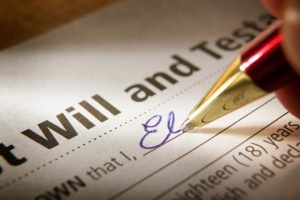11 Jul SUCCESS STORY OF THE MONTH – WHERE THERE IS A BAD WILL, THERE IS A WAY
 Husband and wife (2nd marriage for each and both having children of prior marriage) purchase real estate together, but they fail to deed it into their joint revocable trust that they signed twenty years ago. Since the property wasn’t deeded into the trust, there was need for someone to have the authority to sell the real estate for good title to be conveyed. The trustee lacks authority to sell assets not funded (in this case, not deeded) into the trust. Normally when a joint living trust is signed by a married couple, each spouse signs a “pour-over” will (meaning that assets not funded into the trust that do not have a beneficiary designation pass by the will into the trust through probating the will of each spouse).
Husband and wife (2nd marriage for each and both having children of prior marriage) purchase real estate together, but they fail to deed it into their joint revocable trust that they signed twenty years ago. Since the property wasn’t deeded into the trust, there was need for someone to have the authority to sell the real estate for good title to be conveyed. The trustee lacks authority to sell assets not funded (in this case, not deeded) into the trust. Normally when a joint living trust is signed by a married couple, each spouse signs a “pour-over” will (meaning that assets not funded into the trust that do not have a beneficiary designation pass by the will into the trust through probating the will of each spouse).
Sometimes probate (the process where the court determines if the will is valid) can be avoided if there are no debts and if there is no rush to sell the real estate if the real estate or other assets pass consistent with the laws of intestacy. However, that was not the facts of this case (under Texas intestacy law, the property would be split between the surviving spouse and the children of the deceased spouse).
When one applies for probate, it is best to have the original will (and not a copy) that was signed by the husband and the original will that was signed by the wife (since a copy of the will might require finding witnesses, possibly bringing witnesses to court or having testimony as to handwriting). However, the husband and wife deposited their original wills into their safe deposit box without adding anyone else to the signature card. As a result, the bank requested a court order to drill the box. However, the law permits a bank to open the safe deposit box if there is a descendant of decedent that is over age 18 (which our client was) or if the person named as executor shows the bank a copy of the document that appears to be the will. The contents of the safe deposit box could then be examined by the descendant or executor in front of an authorized employee of the bank, and if the copy and original of the will appear to be the same, the bank could give the original will to the descendant (as they did in our case) or give the original will to the court.
Once the original wills were retrieved from the safe deposit box, additional problems were discovered. One of the witnesses failed to sign the will. In addition, the attorney who acted as the notary (and has since died) put his notary seal on each will, but he failed to sign as a notary. As a result, the court required one of the witnesses testify that the will was properly signed (often witnesses are not required if properly signed). One of the witnesses (who had divorced and remarried and had a different last name) was located by us, but she was moving out of town within a short period of time. The court was willing to work with us for a quicker hearing so that there was no additional expense to the estate. Notwithstanding these issues, both wills were probated.
However, there was one more problem. Although the executor could now sell the real estate, the property proceeds would then need to be distributed according to the terms of the trust. The trust referenced to an exhibit to be attached to the trust as to the manner of distribution. However, no exhibit was ever located. As a result, we needed to get the agreement of the children of both the husband and the wife to agree on the distribution. Since there were other assets (i.e., an IRA) that passed outside either the will or the trust, the parties signed a distribution agreement to reduce risk of future litigation.
So, where there is a will (even if bad), there is a way. To learn more about estate planning essentials our next free workshop is July 12, 2018 at 1:00 p.m. Our August workshop will be held on August 2 at 1:00 p.m. Click here to sign up for either workshop or call us at (214) 720-0102.










